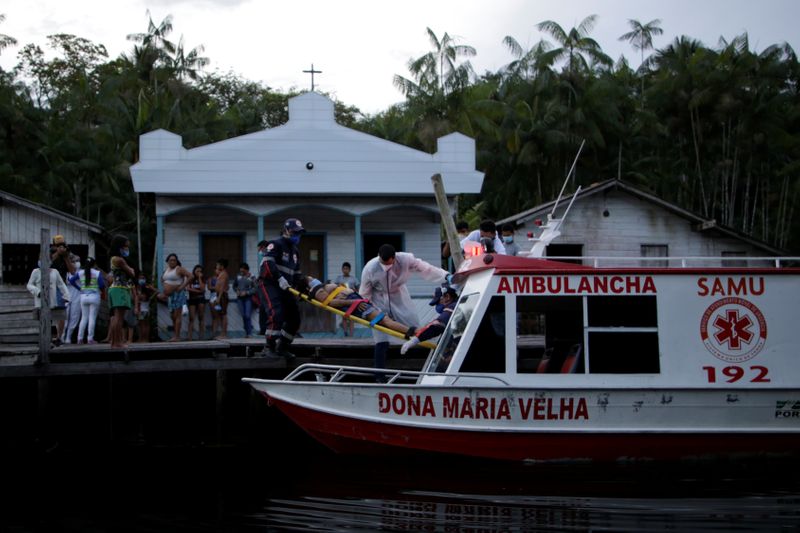By Ueslei Marcelino and Leonardo Benassatto
PORTEL, Brazil (Reuters) - After days suffering from shortness of breath, 49-year-old Andrelina Bizerra da Silva fainted suddenly.
Her family, Brazilian acai berry farmers on a tributary of the Amazon (NASDAQ:AMZN) River, put her in a small boat with an outboard motor and raced down the winding Acuti Pereira River to the nearest health clinic in the town of Portel.
Without tests to confirm if she had COVID-19 or sufficient facilities to treat her if she did, officials at that outpost directed them further downriver to the biggest hospital nearby, in the town of Breves.
Six hours had passed by the time they reached Breves.
Silva was already dead.
"To be honest, there are a lot of negative thoughts among us," said her nephew Felipe Costa Silva, after making the return trip with her coffin in the same boat. "How long is this going to last for? How many people are going to die?"
As the coronavirus outbreak in Brazil rockets past 1 million cases, more than anywhere outside the United States, the frontlines have shifted increasingly from modern hospitals in major cities to poor, remote corners of this massive country.
The cities of Belem and Macapa at the mouth of the Amazon River emerged as major coronavirus hotspots in April and May. The virus has since spread deep into surrounding rural areas.
Reuters spent a week accompanying medical professionals in their battle with the pandemic near Marajo Island, which splits the Amazon in two as it approaches the Atlantic Ocean.
In isolated settlements built on stilts along the river, most households survive on fishing and harvesting local fruits, earning just a few dollars a day. Social distancing is nearly impossible in wooden shacks built close together. Many lack phones and it can take a day or more to reach health clinics.
The coronavirus has taken root here, killing scores and infecting hundreds more, public health records show. Reuters saw that severe infections are often identified and treated late, when odds are against the patients.
Yet public health professionals put on a brave face, making house calls and ferrying patients on hours-long boat trips.
"It's quite complicated because of the difficulty of access," said Alex Glaison, a medic, after treating a patient in their riverside home. "What keeps us going is getting results."
Some residents live 36 hours from the town center, turning healthcare into a logistical nightmare, said Nizomar Junior, the municipal health secretary in Portel, a small town just across the river from Marajo Island.
He leads a sprawling team of medics that routinely travel hours on end, often battling unpredictable currents and fast-approaching weather fronts.
Maria Luiza Costa, a manioc farmer, is one of those isolated residents. She and her mother had come down with headaches and flu-like symptoms, but their coronavirus cases were not confirmed until medical workers visited their home, tucked far up a tributary.
Their sickness had kept them from work. Costa said she was scraping by with a monthly subsidy of 600 reais ($116) from the federal government.
For many residents, the pandemic marks their first contact with the public health system. It is a relief for some, but can bring a gnawing anxiety as treatment means sending relatives far downriver.
Andreza Lima de Cruz, 25, watched as doctors on a floating ambulance motored away with her father to the hospital in Portel after he tested positive for the coronavirus.
"We know that arriving there, there's no certainty that he'll come back," Lima said. "I honestly want him to stay here. But we have to think of him as well."

